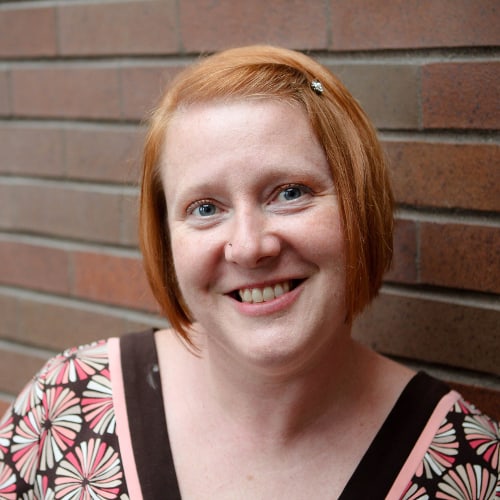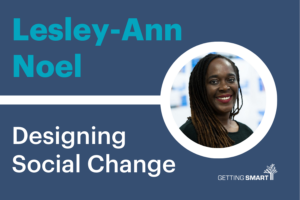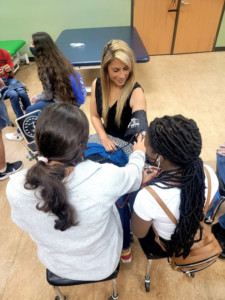Becoming Macro and Micro Focused Educators

When I was in college, I remember learning about Baroque art. The elaborate details and sweeping scenes were breathtaking, but a professor asked us each to find a single detail–a person or a small incident in the painting, and zero in on that, to literally bring our faces in until the rest of the view is obscured.
Not only was this good teaching, given that I just had my 20th college reunion and still remember it, but it is also a great metaphor for assuring readiness for all.
Sometimes, most times even, we are trying to see the big picture, to follow standards, district mandates and the like, while also creating an experience worth remembering for our students. That’s not an easy task, but I’m challenging myself to zero in daily on one student and look for their story to understand the complexities of learning for that particular child.
I’m not asking the impossible of myself or anyone else. I’m not asking that we rewrite curriculum every day or change the lesson plans even. I’m asking that we spend a little time each day considering the needs of one student, make any shifts that would help that child and (probably most importantly) reflect to improve your teaching for next year. Even though the children will change, if we continually reflect and revamp, reflect and revamp, then we are being responsive teachers which is the goal.
Consider The Needs Of One Child
Right away, if I were reading this, I know I’d be critical of this concept, so let me explain. Of course you consider all the students in the room, follow IEPs and 504s, get to know your students and create lasting relationships. That’s not what this is about. That is good teaching and should be the norm.
What I’m suggesting is that we actually see a specific child in his or her space that particular day, watch the needs that arise, and note what is special about this child’s learning style and temperament. In short, learn about children from a child. To believe that we do that for every child, every day is impossible. I have 134 students, and some days I can’t remember if someone was absent that day or not. That doesn’t make me a bad teacher–it makes me one trying to create that broad, sweeping and hopefully breathtaking experience for my students.
Let me tell you about what this looks like in practice. I have a student we’ll call Carey. Carey is gangly, bespeckled and quiet. Often Carey is late to class, but nods an apology, so I don’t pay much attention to it. Great grades. A few friends. Artsy. That’s about all I knew. I decided a few weeks ago to zero in. At the end of class, as Carey packed up, I asked, “What’s your Credo about?” referring to the current assignment.
Carey said, “I’ve tried to create an Owner’s Manual of sorts. Kind of like to a car, but for myself.” I expressed that I was excited to read it, and watched as Carey continued to pack up. Shaking hands. Now running pretty late to lunch. After Carey left, I checked the medical alerts to see if I missed anything, but I didn’t. As I zeroed in throughout the day, I noticed that Carey wasn’t just late and shy, but seemed to have some serious social anxiety as well. It was masked pretty well, but the physical giveaways were there. How could I not see this?
Did you think Carey was a boy? Girl? Black? White? ELL? Wealthy? Poor? Athlete? Artist? I purposely left the pronouns out to show you what I learned. Carey is a wealthy girl who is an athlete. If you were wrong about what to expect from her, you’d be just like me. One student taught me quite a bit about my unconscious assumptions than I think I’ve ever had. One student. Every day. By zeroing in on one child, you’ll have new insights that can impact your future planning.
Being Macro and Micro Responsive
One of the first times I ever heard the phrase “responsive classroom” was when I read Solving Thorny Behavior Problems. This interview with the author, Caltha Crowe, is packed with practical advice about how to get to know your students, and also an important perspective about the impact it has on classroom management and the success for students with behavioral challenges. I’d like to suggest that educators are charged with being responsive in the macro–in making our voices heard, staying informed, acting on behalf of our students, and voting–but also in the micro, the zeroed in world of those kiddos right in front of us.
If I pan out from my individual student, from my individual classroom, I see the chaos that surrounds education and the political battlefield that is brutal. When we are at a loss for what to do when we are struck by the broad, sweeping view, it is always crucial to come back to one thing: relationships. Here, Tom Vander Ark shares a moment from the not-so-distant past that seems very far away: David Brooks’ response to former President Obama’s Education speech in The New York Times.
We must, as teachers, zero in on our own classrooms and our own students, know their stories and teach them well. It is those individuals who will determine the outcome of the battles ahead.
For more, see:
- Do You Want To Be A Thought Leader?
- Three Tips for Stoking the Fires of Overachievers
- Project Management Solutions for the 21st-Century Student
Stay in-the-know with all things EdTech and innovations in learning by signing up to receive the weekly Smart Update.







Emily
Hey! I really like this concept. The big push from our district this year was identifying "focal students" ones that are high-risk, difficult any variety of reasons (attendance,learning disability, behavior, etc.) and plan our lessons explicitly addressing what sort of modification we are making with those particular students in mind. Of course, we all complained about the extra paper work but it HELPED! I love that you wrote about this, but I would love to see even more in depth explanation and commentary on it. Can you write another ha! Even touch on the macro implications, leave less students in the dust? Not missing those middle ground students either?